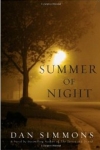[Editor’s Note: here’s the review that previously ran in one of our Book Review Projects. As always, our sincere thanks to Sheila for her insightful and intelligent reviews. They are always appreciated.]
Summer of Night
Dan Simmons
St. Martin’s Griffin
Paperback, 608 pages, $15.99
Review by Sheila M. Merritt
School’s out. The days are long and hot. There is a stirring in the air. It’s summer, and for six kids on the brink of adolescence a major change is about to happen. Yes, it’s the inevitable just around the corner; but there’s more. Supernaturally more; scarily more. In Summer of Night, Dan Simmons examines a petrifying puberty. Stephen King went there in It, and certainly Summer of Night bears similarities to that work. Simmons, however, embraces the theme and its permutations in his own strong and unique voice. He conveys the sensations of the season and the qualities, qualms, and questions inherent in being eleven years old. At once endearing and terrifying, the novel shakes up youthful memories and places them in an ambience of evil.
Old Central School is closing. Its last students are happy to leave the edifice. “By the spring of 1960, Old Central School had come to resemble some of the ancient teachers who had taught in her: too old to continue but too proud to retire, held stiffly upright by habit and a simple refusal to bend. Barren herself, a stiff old spinster, Old Central borrowed other people’s children over the decades.”
Among these children are: Duane, a motherless only child; brilliant beyond the comprehension of teachers. Dale, who comes from a stable home; sensitive, and fiercely protective of younger brother Lawrence. Michael, the only son in a large Catholic family; pious and attentive. Cordie, a seemingly dim witted girl living in dysfunctional poverty; deceptively aware of what’s happening around her. Harlen; resides with his irresponsible mother, whose antics make him sarcastic and embittered. Kevin, who snaps to at the call of his mom’s cry. This mélange of moppets become allies against a malign force which attacks their small town of Elm Haven, Illinois.
Possessing the resourcefulness and determination of the young, the ensemble bravely squares off against a loathsome and lethal adversary. The uncanny entity has minions in the local populace; some living, some dead. For the kids, the psychic torment is intense: “It was a deep, sick-making terror, a fear of the dark combined with the startle-awake sound of someone breathing under your bed. It was the terror of embalming tools and the blade at the eye, the terror of the cold hand on the back of your neck in a dark room.”
Simmons doesn’t merely summon up the scares; they pulsate through a narrative that is eloquently evocative of its environment and time period. The author sets the story during the political and cultural shift of 1960: A possibility of a Catholic president; the space race; color television; an atmosphere that teeters on transition. There’s anticipation, and anxiety; an undercurrent of the unease of altering.
Almost like a background character, summer plays a part in the story. There’s baseball, barbecues, and a seasonal sensuality specific for the time of year: “A breeze had come up to give relief from the humidity and rustle the branches above the lawn. The endless cornfields on the west side of the road and to the north seemed to sigh in some silken language.”
Amidst the lures and attraction of the season, the focal youths are thrust into a brutal coming of age: They are privy to knowledge hidden from most of the adult population of Elm Haven. Their response has ramifications far beyond the town boundaries; a lot of weight on very small shoulders. The author makes these young folk extremely dear; each one possesses a well delineated personality, with specific flaws and fears. All possess ability to access courage that belies their years.
In observance of the time of year, and the changes it brings, Summer of Night is at once an ode and a harbinger. It is easy to be lulled to a sense of temporal torpidity, but what about that impending thunderstorm or tornado? Simmons indicates that those forces (and other less foreseen forces) will be dealt with as necessary. In the meantime, there is much to be appreciated and it is often taken for granted: “Evening fell a bit earlier this night than the last, almost imperceptibly so but enough to remind the careful observer that the solstice had passed and that the days were getting shorter rather than longer. The sunset was that long, achingly beautiful balance of stillness in which the sun seemed to hover like a red balloon above the western horizon, the entire sky catching fire from the death of day, a sunset unique to the American Midwest and ignored by most of its inhabitants.”
Summer of Night is a novel that reflects back on an era, and harnesses heartbreak and horror on an emotionally intimate level. Dan Simmons taps into the readily recognizable commonplace and then whips it into something suspenseful and unsettling. There are shadows in his sunsets, and they refuse to be ignored.










Very eloquent and thoughtful review. This is a great book and you are so right about the characters…the boys became very dear to me.